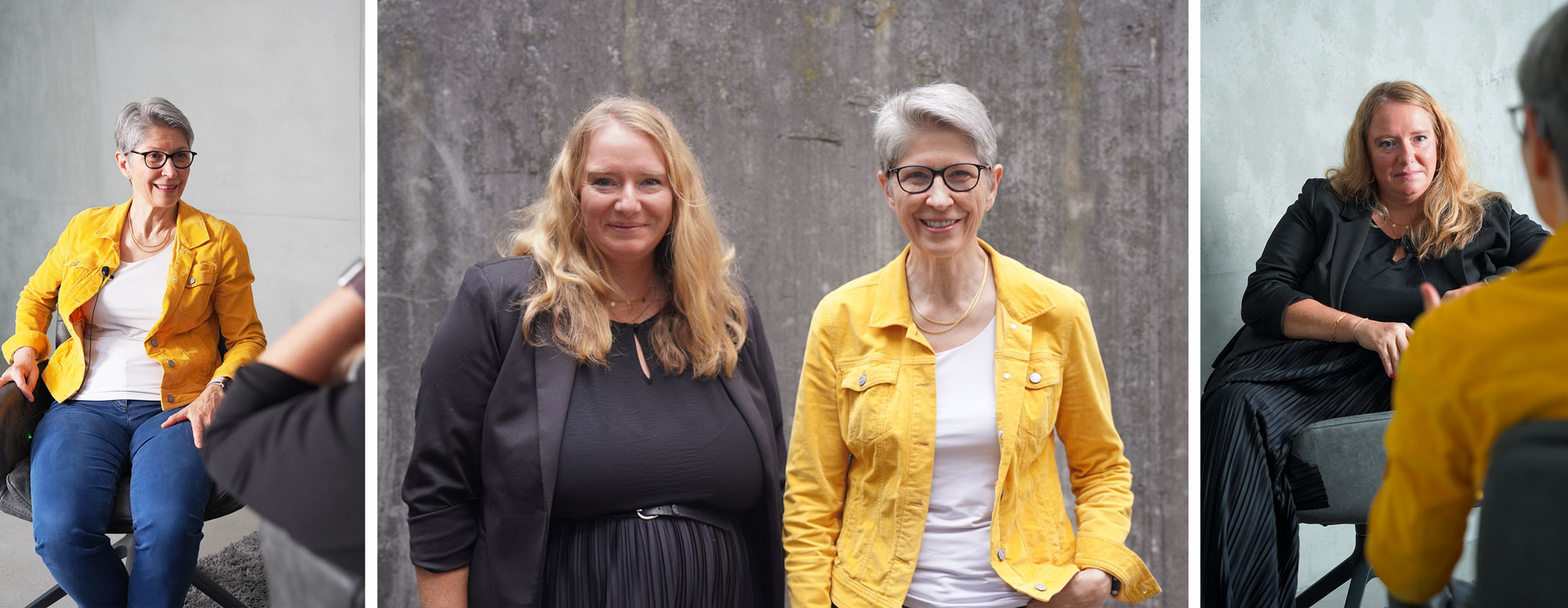A Conversation With Potential Expert Ursula Franke About Development, Depth, and an Analysis Method That Really Delivers Meaningful Results
How can you recognize a person’s potential before it becomes apparent in everyday life? What distinguishes a sound potential analysis from standard personality tests? And how can you learn to recognize potential professionally and support people in their development?
Debora Karsch discussed these very topics at the persolog® HR Conference with Ursula Franke, psychologist and managing director of commma Personalentwicklung GmbH. The intensive discussion gave rise to the idea of training to become a potential scout – a practical, psychologically sound format for coaches, HR professionals, and managers.
Debora Karsch: Ursula, how did you get into potential analysis?
Ursula Franke: I would love to say that I woke up one morning and just knew – but of course that’s not how it was. I grew into it over the course of my work. What kept me going was my fascination with the subject. It offers the opportunity to go into depth, to touch people, to set processes in motion – similar to a therapeutic context, but within a business framework.
Debora Karsch: What does potential mean to you?
Ursula Franke: Potential is what someone has within them — even if it is not yet visible. It is possibilities, talents, qualities that may not yet have been developed. Managers often sense that there is more to someone than meets the eye. The question then is: Where can this potential be developed? And what is needed to achieve this?
Debora Karsch: And how do you define development?
Ursula Franke: Development begins when there is clarity about potential. It is the path that follows analysis. For me, it is important to paint a precise picture and make a well-founded recommendation. Implementation — i.e. the development — is then up to HR, managers, or coaching.
Debora Karsch: Is it even possible to fully develop a person’s entire potential?
Ursula Franke: I don’t think it ever stops. After more than 30 years of professional experience and over 60 years of life experience, I would say that there is always something new to discover, especially when it comes to topics such as leadership, which have so many facets. Potential is never “fully” exhausted. And that’s exactly what makes it so exciting.
Debora Karsch: How does a potential analysis differ from a personality analysis?
Ursula Franke: Both are personality analyses, but at different levels. A potential analysis goes deeper. It’s not just about how you behave in everyday life, but also about the question: Why do you react that way? What motives, emotions, or influences are behind it? I see my work as a very individual puzzle in which many small impressions come together to form a coherent whole.
Debora Karsch: How do you conduct a potential analysis?
Ursula Franke: I go into the conversation completely unbiased. I know nothing about the person beforehand. In an interview lasting around three hours, I talk to them about their current role, difficult situations and their perspective on them. I ask questions, reflect with the person and explore certain topics in greater depth. The aim is to find out what drives people internally – and what might be holding them back.
Here’s an example: One employee really wanted to become a manager, but during the interview it became clear that he had little understanding of interpersonal dynamics. In the end, we didn’t recommend him for a management role, but we did give him specific advice for further development.
Debora Karsch: How can people remain open throughout this process? It can be emotionally challenging.
Ursula Franke: Through genuine interest and time. Three hours are intense, but they allow for depth. I listen without judgment. And people can feel that. In over 700 potential analyses, I’ve experienced that when you give people space, they show you who they truly are. Every person is fascinating – you just have to ask the right questions.
Debora Karsch: What happens after the interview?
Ursula Franke: There is a cognitive test module that I evaluate in parallel. I then provide initial feedback before compiling a detailed report. This contains clear recommendations — even if they are sometimes uncomfortable. But I always formulate constructive suggestions on how someone can work on specific issues.
Debora Karsch: When is a potential analysis particularly worthwhile for companies?
Ursula Franke: Whenever important decisions need to be made — for example, regarding junior managers or internal transfers. But also for employees who have been with the company for a long time and are wondering what the future holds for them. A potential analysis is not just a tool — it also sends a signal: “You are important to us. We are investing in your development.”
Debora Karsch: What inspires you personally about your work?
Ursula Franke: The depth, the trust, the insights – and the feedback years later when people say, “This changed me.” That is very moving. One of my participants told me after two years that without this impulse, he would never have developed the way he did. Today, he is a recognized leader.
Debora Karsch: How does a potential analysis benefit the company?
Ursula Franke: Clarity. An objective assessment, independent of internal dynamics or biases. This helps companies avoid bad hires, make better decisions, and foster talents more effectively. At the same time, the analysis also provides insights into where structural development is needed.
Debora Karsch: How does your role in potential analysis differ from coaching?
Ursula Franke: In potential analysis, I act as an assessor: I gather information and evaluate. In coaching, however, I am a supporter on the coachee’s journey. These are two very different roles. For me, it’s important to consciously keep this distinction.
Debora Karsch: What skills do managers need today?
Ursula Franke: Self-reflection. The ability to deal with uncertainty and complexity. A good sense of yourself — and of others. And above all: the courage not to avoid conflicts, but to shape them. Leadership today is not a popularity contest. It’s about attitude, clarity, and responsibility.
Debora Karsch: If someone thinks, “I’d like to learn that too,” what would you recommend?
Ursula Franke: You need psychological knowledge, interview experience, a deep understanding of personality – and the ability to accurately assess behavior. And yes, it takes experience. This isn’t something you can learn in a weekend seminar.



